|
Books Should Be Free Loyal Books Free Public Domain Audiobooks & eBook Downloads |
|
|
Books Should Be Free Loyal Books Free Public Domain Audiobooks & eBook Downloads |
|
Top Authors |
|---|
|
Book type:
Sort by:
|
By: Herbert George Jenkins (1876-1923) | |
|---|---|
 The Life of George Borrow
The Life of George Borrow
| |
 Adventures of Bindle
Adventures of Bindle
Jenkins' most popular fictional creation was Mr. Joseph Bindle, who first appeared in a humorous novel in 1916 and in a number of sequels. In the preface to the books, T. P. O'Connor said that "Bindle is the greatest Cockney that has come into being through the medium of literature since Dickens wrote Pickwick Papers". The stories are based on the comedic drama of life at work, at home and all the adventures that take place along the way. | |
By: Henry Charles Lea (1825-1909) | |
|---|---|
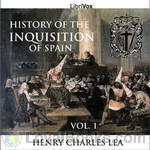 History of the Inquisition of Spain
History of the Inquisition of Spain
The first volume of Lea’s monumental work on the Inquisition of Spain, covering its origin and establishment and its relations with the state. Also included are appendices listing Tribunals, Inquisitors-General, and Spanish coinage. | |
By: Edward M. Forster (1879-1970) | |
|---|---|
 The Celestial Omnibus and other Stories
The Celestial Omnibus and other Stories
| |
By: Paul | |
|---|---|
 The Sheridan Road Mystery
The Sheridan Road Mystery
A shot rings out in the middle of the night in a quiet Chicago neighborhood. Patrolman Murphy is directed to an apartment where a man says the shot came from. The apartment is locked and apparently empty. Was there a murder here? And if so, where is the victim? | |
By: Stewart Edward White (1873-1946) | |
|---|---|
 Conjuror's House, a Romance of the Free Forest
Conjuror's House, a Romance of the Free Forest
In the northern outreaches of the Canadian wilderness, it was understood that the Hudson Bay Company governed all trading, and one factor named Galen Albret took his position seriously. Free traders, or those who dared try to do their trading outside of the Company, found themselves having to face Galen Albret and his methods of dealing with them. One or two offenses he might tolerate, but for those who repeatedly refuse to acknowledge his warning out, he would send them on “La Longue Traverse” through the wilderness without supplies, and from which they seldom returned... | |
 The Blazed Trail
The Blazed Trail
Stewart Edward White wrote fiction and non-fiction about adventure and travel, with an emphasis on natural history and outdoor living. White's books were popular at a time when America was losing its vanishing wilderness and many are based on his experiences in mining and lumber camps. The Blazed Trail is the story of early lumbermen in the northern woods of Michigan. The novel portrays the challenges faced by the workers focusing on one, Harry Thorpe, as he endeavors to be successful though completely unskilled when he enters the woods... | |
 Arizona Nights
Arizona Nights
Arizona Nights is a collection of tales from the American West as told by those who took part in them. | |
 Camp and Trail
Camp and Trail
| |
 The Killer
The Killer
| |
 African Camp Fires
African Camp Fires
| |
 Gold
Gold
This is a well written story of the California gold rush of 1849. Four friends decide they are going to go to California and get rich in the gold fields. Follow their adventures as they travel to California across the isthmus of Panama to San Francisco. In their search for gold they encounter hostile Indians, various desperadoes, and natural disasters. Did they strike it rich? Listen and find out. | |
 The Westerners
The Westerners
| |
 The Silent Places
The Silent Places
| |
 The Rules of the Game
The Rules of the Game
| |
 The Mountains
The Mountains
| |
 Blazed Trail Stories and Stories Of The Wild Life
Blazed Trail Stories and Stories Of The Wild Life
Thirteen short stories by a popular writer of the early 20th century (not to be confused with an earlier book Blazed Trail). White's books were popular at a time when America was losing its vanishing wilderness. He was a keen observer of the beauties of nature and human nature, yet could render them in a plain-spoken style. Based on his own experience, whether writing camping journals or Westerns, he included pithy and fun details about cabin-building, canoeing, logging, gold-hunting, and guns and fishing and hunting... | |
 The Riverman
The Riverman
| |
 The Land of Footprints
The Land of Footprints
| |
 The Forty-Niners A Chronicle of the California Trail and El Dorado
The Forty-Niners A Chronicle of the California Trail and El Dorado
| |
 The Forest
The Forest
| |
 The Adventures of Bobby Orde
The Adventures of Bobby Orde
| |
 The Call of the North
The Call of the North
| |
 The Gray Dawn
The Gray Dawn
| |
 The Leopard Woman
The Leopard Woman
| |
 The Claim Jumpers
The Claim Jumpers
| |
By: James Cook | |
|---|---|
 A Voyage Towards the South Pole and Round the World
A Voyage Towards the South Pole and Round the World
Having, on his first voyage, discovered Australia, Cook still had to contend with those who maintained that the Terra Australians Incognita (the unknown Southern Continent) was a reality. To finally settle the issue, the British Admiralty sent Cook out again into the vast Southern Ocean with two sailing ships totalling only about 800 tons. Listen as Cook, equipped with one of the first chronometers, pushes his small vessel not merely into the Roaring Forties or the Furious Fifties but becomes the first explorer to penetrate the Antarctic Circle, reaching an incredible Latitude 71 degrees South, just failing to discover Antarctica. (Introduction by Shipley) | |
 Captain Cook's Journal During the First Voyage Round the World
Captain Cook's Journal During the First Voyage Round the World
| |
 Directions for Navigating on Part of the South Coast of Newfoundland
Directions for Navigating on Part of the South Coast of Newfoundland
| |
By: Fred M. White (1859-?) | |
|---|---|
 The Mystery of the Four Fingers
The Mystery of the Four Fingers
A fabulously rich gold mine in Mexico is known by the picturesque and mysterious name of The Four Fingers. It originally belonged to an Aztec tribe, and its location is known to one surviving descendant. Surprises, strange and startling, are concealed in every chapter of this completely engrossing detective story. And through it runs the thread of a curious love story. | |
By: George Washington Plunkitt (1842-1924) | |
|---|---|
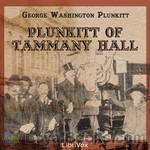 Plunkitt of Tammany Hall
Plunkitt of Tammany Hall
“I seen my opportunities and I took ‘em.”, George Washington Plunkitt of Tamminy Hall. There’s honest graft and dishonest graft according to Plunkitt. Listen to this candid discourse from a 19th century politician, and decide for yourself if things have changed. | |
By: Christina & Dante Gabriel Rossetti | |
|---|---|
 Selected Poems
Selected Poems
Dante Gabriel Rossetti (1828-1882) and his sister Christina Georgina Rossetti (1830-1894) played important roles in the artistic milieu of Victorian England. Members of a highly cultured Italian immigrant family, they achieved widespread fame and exerted a significant influence upon the poetry and art of their time.Dante Gabriel was a co-founder of the Pre-Raphaelite Brotherhood of painters, contributing to a renewed interest in medieval themes and techniques. Both his painting and his poetry anticipated the Aesthetic movement of the late 19th and early 20th centuries... | |
By: William Healy, Mary Healy | |
|---|---|
 Pathological Lying, Accusation, and Swindling – A Study in Forensic Psychology
Pathological Lying, Accusation, and Swindling – A Study in Forensic Psychology
This work describes and analyzes several cases of pathological behavior. The interest comes not only from the cases themselves, but also from the of-its-time analysis which is mired in what we now know to be wrong thinking about mental illness, sexuality, gender, and race. - written by Mary Schneider | |
By: John Mark | |
|---|---|
 Jesus of Nazareth, A Biography
Jesus of Nazareth, A Biography
"Jesus of Nazareth, a Biography, by John Mark," recognizes the author of the second Gospel as that "John, whose surname was Mark" (Acts 15:37), whom Barnabas chose as companion when he sailed for Cyprus on his second missionary journey. In making use of the new title, the plan of the Editor is to present "The Gospel: According to Mark" as it would be printed were it written in the twentieth rather than the first century. (Introduction from Forward, by D. Appleton & Co, Publishers, 1922) | |
By: Leigh Brackett (1915-1978) | |
|---|---|
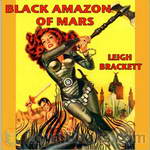 Black Amazon of Mars
Black Amazon of Mars
Carrying out the last wishes of a comrade, mercenary Eric John Stark takes on the task of returning a stolen talisman to a walled city near the Martian pole; a city that guards the mysterious Gates of Death. Now all he has to do is get past the brutal clans of Mekh and the shadowy Lord Ciaran to get to Kushat where they’ll probably attempt to kill him. All while he tries to hold on to a talisman that imprints ancient memories of the Gates in his mind. That’s not easy for a human raised by Mercurian aborigines... | |
By: Marcel Allain (1885-1969) | |
|---|---|
 Fantômas
Fantômas
Fantômas is the first of 32 novels penned from 1911 to 1913 by Marcel Allain and Pierre Souvestre. The title character is a ruthless thief and killer, a bloodthirsty successor to LeBlanc's Arsène Lupin. The first five novels were made into silent film serials. The character and the movies caught the eye of the French Surrealists who admired the primal violence of Fantômas, as well as his portrayal in the films, which are considered landmarks in French Cinema. In Fantômas, the Marquise de Langrune is savagely murdered and Inspector Juve, who is obsessed with capturing Fantômas, arrives to solve the murder. | |
 Messengers of Evil
Messengers of Evil
Fantômas was introduced a few years after Arsène Lupin, another well-known thief. But whereas Lupin draws the line at murder, Fantômas has no such qualms and is shown as a sociopath who enjoys killing in a sadistic fashion. He is totally ruthless, gives no mercy, and is loyal to none, not even his own children. He is a master of disguise, always appearing under an assumed identity, often that of a person whom he has murdered. Fantômas makes use of bizarre and improbable techniques in his crimes, such as plague-infested rats, giant snakes, and rooms that fill with sand... | |
 A Nest of Spies
A Nest of Spies
| |
 A Royal Prisoner
A Royal Prisoner
| |
By: Valmiki (ca. 400 BC?) | |
|---|---|
 The Ramayana, Book 1
The Ramayana, Book 1
The Ramayana is an ancient Sanskrit epic. It is attributed to the Hindu sage Valmiki and forms an important part of the Hindu canon (smṛti). The Ramayana is one of the two great epics of India, the other being Mahabharata. It depicts the duties of relationships, portraying ideal characters like the ideal servant, the ideal brother, the ideal wife and the ideal king. | |
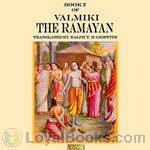 The Ramayana Book 2
The Ramayana Book 2
The Ramayana is an ancient Sanskrit epic. It is attributed to the Hindu sage Valmiki and forms an important part of the Hindu canon (smṛti). The Ramayana is one of the two great epics of India, the other being Mahabharata. It is the story of Rama, who emabrks on an epic journey followed by the fight with Ravana, the demon king who abducted Rama's wife, Sita. The epic depicts the duties of relationships, portraying ideal characters like the ideal servant, the ideal brother, the ideal wife and the ideal king. (Introduction by Om123) | |
 Hindu literature : Comprising The Book of good counsels, Nala and Damayanti, The Ramayana, and Sakoontala
Hindu literature : Comprising The Book of good counsels, Nala and Damayanti, The Ramayana, and Sakoontala
| |
By: William Butler Yeats (1865-1939) | |
|---|---|
 The Wild Swans at Coole
The Wild Swans at Coole
The Wild Swans at Coole is a collection of poems by William Butler Yeats, first published in 1917. It is also the name of a poem in that collection. The Wild Swans at Coole is in the "middle stage" of Yeats' writing and is concerned with, amongst other themes, Irish nationalism and the creation of an Irish aesthetic. | |
 The Celtic Twilight
The Celtic Twilight
| |
 Ideas of Good and Evil
Ideas of Good and Evil
| |
 The Wind Among the Reeds
The Wind Among the Reeds
| |
 The Secret Rose
The Secret Rose
| |
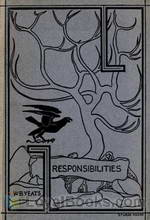 Responsibilities and other poems
Responsibilities and other poems
| |
 The Trembling of the Veil
The Trembling of the Veil
| |
 Seven Poems and a Fragment
Seven Poems and a Fragment
| |
 The Countess Cathleen
The Countess Cathleen
| |
 The Unicorn from the Stars and Other Plays
The Unicorn from the Stars and Other Plays
| |
 Rosa Alchemica
Rosa Alchemica
| |
 In The Seven Woods Being Poems Chiefly of the Irish Heroic Age
In The Seven Woods Being Poems Chiefly of the Irish Heroic Age
| |
 The Hour Glass
The Hour Glass
| |
 Discoveries A Volume of Essays
Discoveries A Volume of Essays
| |
 The Land of Heart's Desire
The Land of Heart's Desire
| |
 Reveries over Childhood and Youth
Reveries over Childhood and Youth
| |
 Per Amica Silentia Lunae
Per Amica Silentia Lunae
| |
 Two plays for dancers
Two plays for dancers
| |
 Four Years
Four Years
| |
 The Cutting of an Agate
The Cutting of an Agate
| |
 Mosada A dramatic poem
Mosada A dramatic poem
| |
 Stories of Red Hanrahan
Stories of Red Hanrahan
| |
 Synge and the Ireland of His Time
Synge and the Ireland of His Time
| |
By: William Law | |
|---|---|
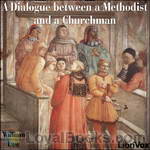 A Dialogue between a Methodist and a Churchman
A Dialogue between a Methodist and a Churchman
William Law (1686-1761) was an Anglican priest, Christian mystic, and one of the most prominent, popular, and controversial theological writers of his time. Law revolutionized the way in which 18th century Anglicans engaged the spiritual aspect of their faith, and his popularity rivaled that of John and Charles Wesley. Law adapted mystical practices from early church writings to the practice and doctrine of the modern British church, with the intention of equipping the Anglican layman to pursue intimacy with Christ... | |
By: Abraham Tomlinson | |
|---|---|
 The Military Journals of Two Private Soldiers, 1758-1775
The Military Journals of Two Private Soldiers, 1758-1775
“Perceiving that much of the intrinsic value of these Journals would consist in a proper understanding of the historical facts to which allusions are made in them, I prevailed upon Mr. Lossing, the well-known author of the “Pictorial Field-Book of the Revolution” to illustrate and elucidate these diaries by explanatory notes. His name is a sufficient guaranty for their accuracy and general usefulness” | |
By: Sara Cone Bryant (1873-?) | |
|---|---|
 How to Tell Stories to Children, and Some Stories to Tell
How to Tell Stories to Children, and Some Stories to Tell
Sara Cone Bryant was an educator and storyteller who wrote several books on the importance of oral storytelling to children, and stories to tell children. This volume expounds on her theories and practices of telling stories to children, and provides several examples. Her conversational writing style makes this work as relevant for parents and teachers as it was 90 years ago. | |
 Stories to Tell to Children
Stories to Tell to Children
| |
 Stories to Tell Children Fifty-Four Stories With Some Suggestions For Telling
Stories to Tell Children Fifty-Four Stories With Some Suggestions For Telling
| |
By: Carey Rockwell | |
|---|---|
 Stand by for Mars
Stand by for Mars
Tom Corbett - Space Cadet was one of the first multimedia sensations. In the 1950s the character had his own radio show, TV series, comic book, breakfast cereal, and a line of young-adult novels. A cross between "Tom Brown's School Days" and Horatio Hornblower (and loosely based upon Robert A. Heinlein's novel "Space Cadet"), the books follow the adventures of Tom and his friends Roger Manning and Astro as they work their way through Space Academy to become officers of the Solar Guard. Along the way they tangle with space pirates, smugglers, and the threat of demerits for breaking the rules... | |
 Danger in Deep Space
Danger in Deep Space
| |
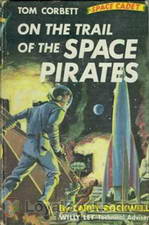 On the Trail of the Space Pirates
On the Trail of the Space Pirates
Tom Corbett is the main character in a series of Tom Corbett — Space Cadet stories that were depicted in television, radio, books, comic books, comic strips, and other media in the 1950s. The stories followed the adventures of Corbett and other cadets at the Space Academy as they train to become members of the Solar Guard. The action takes place at the Academy in classrooms and bunkrooms, aboard their training ship the rocket cruiser Polaris, and on alien worlds, both within our solar system and in orbit around nearby stars... | |
 Sabotage in Space
Sabotage in Space
This book is part of the on-going adventures of Tom Corbett in the Space Cadet Stories. Tom, Astro and Roger are determined to find the saboteurs but get framed in the process, risking court martial and expulsion from the Space Academy. NOTE: Carey Rockwell is a pseudonym used by Grosset & Dunlap. It is unknown who wrote the books. | |
By: Kathleen Norris | |
|---|---|
 Mother
Mother
With seven children and a home to take care of, Margaret wondered how her Mother could be so happy living a life that seemed all drudgery. As Margaret has new experiences, she comes to realize that “her mother was not only the truest, the finest, the most generous woman she had ever known, but the happiest as well”. | |
By: Emperor of Rome Marcus Aurelius (121-180) | |
|---|---|
 Thoughts of Marcus Aurelius Antoninus
Thoughts of Marcus Aurelius Antoninus
| |
 Thoughts of Marcus Aurelius
Thoughts of Marcus Aurelius
| |
By: Barton Wood Currie | |
|---|---|
 Officer 666
Officer 666
Bored with his life as a wealthy businessman's only son, Travers Gladwin learns of a plot by a renowned art burglar to rob his house, so rather than thwart the planned burglary, he borrows a police uniform from a friend and decides to confront the robber by posing as an officer. When the burglar arrives at the house, he tries to pass himself off as Travers Gladwin. From there, things only get more complicated, including the arrival of the burglar's girlfriend who believes that her beau is the wealthy man's son. Comical and timely, the book was made into a movie multiple times, each hugely successful. | |
By: Clara Reeve (1729-1807) | |
|---|---|
 The Old English Baron
The Old English Baron
The story follows the adventures of Sir Philip Harclay, who returns to medieval England to find that the castle seat and estate of his friend Lord Lovel have been usurped. A series of revelations, horrors and betrayals climax in a scene of single combat in which good battles evil for the return of the prize. | |
By: Doris Stevens (1892-1963) | |
|---|---|
 Jailed for Freedom
Jailed for Freedom
A first-hand account of the 1913-1919 campaign of American suffragists, detailing their treatment at the hands of the courts, and the true conditions of their incarceration. | |
By: Elsie Spicer Eells | |
|---|---|
 Fairy Tales from Brazil
Fairy Tales from Brazil
This book, subtitled "How and Why Tales from Brazilian Folk-Lore", is a collection of short stories, most of them etiologial myths from Brazilian Indian Folklore. | |
 Tales of Giants from Brazil
Tales of Giants from Brazil
| |
By: Robert Tressell | |
|---|---|
 The Ragged Trousered Philanthropists
The Ragged Trousered Philanthropists
Clearly frustrated at the refusal of his contemporaries to recognise the iniquity of society, Tressell’s cast of hypocritical Christians, exploitative capitalists and corrupt councillors provide a backdrop for his main target — the workers who think that a better life is “not for the likes of them”. Hence the title of the book; Tressell paints the workers as “philanthropists” who throw themselves into back-breaking work for poverty wages in order to generate profit for their masters... | |
By: Charles W. Diffin (1884-1966) | |
|---|---|
 Two Thousand Miles Below
Two Thousand Miles Below
A science fiction novel that was originally produced in four parts in the publication: Astounding Stories in June, September, November 1932, January 1933. The main character is Dean Rawson, who plans on discovering a way of mining power from a dead volcano, but ends up discovering more than he bargained for. | |
By: Clara Barton (1821-1912) | |
|---|---|
 The Story of My Childhood
The Story of My Childhood
Clara Barton, founder of the American Red Cross, recalls growing up in early 19th Century Massachusetts. (Introduction by Veronica Jenkins) | |
 A Story of the Red Cross Glimpses of Field Work
A Story of the Red Cross Glimpses of Field Work
| |
By: Andrew Jackson | |
|---|---|
 Robert O'Hara Burke
Robert O'Hara Burke
A non-fictional account of Burke and Wills’s 1860 expedition to cross the Australian continent from south to north and then return. Containing many excerpts from the diaries and accounts of the explorers, this book was published the year after the expedition met its disastrous end.(description written by trioptimum) | |
 State of the Union Address
State of the Union Address
| |
By: Edwin E. Slosson (1865-1929) | |
|---|---|
 Easy Lessons in Einstein
Easy Lessons in Einstein
Published in 1920, Slosson’s Easy Lessons in Einstein is one of the first popularizations of Einstein’s theory of relativity. This book is meant to convey to the general reader the ideas of relativity in non-mathematical terms, by the use of thought experiements and pop-cultural references of the day. This edition also includes a short article by Einstein on Time, Space and Gravitation. | |
 Creative Chemistry
Creative Chemistry
Slosson reviews the transformation of alchemistry from an obscure and imprecise practice to the science of chemistry. Along the way, he explains how the modern industrial world now relies on fertilizers, explosives, textile materials, polymers and metals.By exploring the properties of a once undervalued element, the high strength of vanadium steel made the Ford car possible. Another element, cerium, appears in butane lighters and was once seen as a threat to the match industry in France.In his chapter on oils, Slosson reviews the development of hydrogenated oils, especially during WWII, in the search for a way to reuse otherwise discarded components of corn and cottonseed... | |
By: George Müller (1805-1898) | |
|---|---|
 Answers to Prayer, from George Müller's Narratives
Answers to Prayer, from George Müller's Narratives
Mr. Brooks, in this compilation, has endeavored to select those incidents and practical remarks from Mr. Müller's Narratives, that show in an unmistakeable way, both to believers and unbelievers, the secret of believing prayer, the manifest hand of a living God, and His unfailing response, in His own time and way, to every petition which is according to His will. (From the Preface) | |
By: Miles Franklin | |
|---|---|
 My Brilliant Career
My Brilliant Career
Sybella “There is no plot in this story, because there has been none in my life or in any other life which has come under my notice. I am one of a class, the individuals of which have no time for plots in their life, but have all they can do to get their work done without indulging in such a luxury”. Like the author Miles Franklin, Sybella grows up in the bush, and as her family’s fortunes decline, so her feelings rise that life should hold more for her than the relentless hard physical work farming marginal land in times of drought. | |
By: Bahá'u'lláh | |
|---|---|
 The Arabic Hidden Words
The Arabic Hidden Words
Kalimát-i-Maknúnih or The Hidden Words is a book written in Baghdad around 1857 by Bahá'u'lláh, the founder of the Bahá'í Faith. This work is written partly in Arabic and partly in Persian. The Hidden Words is written in the form of a collection of short utterances, 71 in Arabic and 82 in Persian, in which Bahá'u'lláh claims to have taken the basic essence of certain spiritual truths and written them in brief form. Bahá'ís are advised by `Abdu'l-Bahá, the son of Bahá'u'lláh to read them every day and every night and to implement its latent wisdom into their daily lives... | |
By: Robert C. Leslie (1826-1901) | |
|---|---|
 A Waterbiography
A Waterbiography
Robert C. Leslie (1826-1901) was an artist and writer who, at an early age fell in love with the sea, the sea of Sail, not of Steam. He describes the progression of this love from wave to wave and boat to boat. Leslie sailed during the Great Age of Sail before Industrialism had taken possession of Britain. Leslie comments on the early days of singlehanded small boat sailing: “When I first began boating in the early forties[1840s], what is now called single-handed cruising was almost unknown among amateurs…... | |
By: William Sangster (1808-1888) | |
|---|---|
 Umbrellas and Their History
Umbrellas and Their History
A whimsically serious look at the umbrella and society. | |
By: E. T. A. Hoffmann (1776-1822) | |
|---|---|
 Weird Tales, Vol. II.
Weird Tales, Vol. II.
| |
 The Serapion Brethren. Vol. II
The Serapion Brethren. Vol. II
| |
 The Devil's Elixir Vol. I (of 2)
The Devil's Elixir Vol. I (of 2)
| |